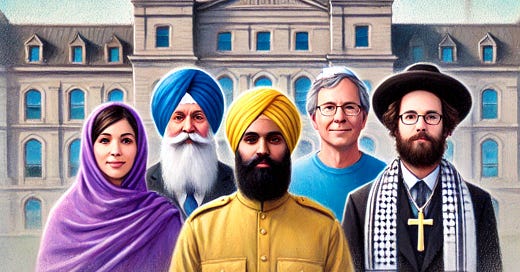Quebec's Ban on Sikh Turbans: A Blow to Religious Freedom in Canada
Applies to public servants employed by the provincial government of Quebec, banning the use of Sikh turbans, Muslim hijabs, Christian crosses, and Jewish kippahs while at work.
The Ban on Sikh Turbans: A Blow to Religious Freedom in Quebec
An inequitable, if not iniquitous, law passed by the Legislative Assembly of the province of Quebec in Canada has not received much attention in India, despite its impingement on the religious freedom of the Sikh community. In 2019, the Quebec National Assembly enacted legislation banning public servants from wearing religious symbols, including Sikh turbans, Muslim hijabs, and Jewish kippahs. This controversial law, purportedly aimed at promoting a secular state, applies to teachers, police officers, judges, and other public servants employed by the provincial government and its subordinate boards and corporations. The Canadian Sikh community, in particular, views this as a gross infringement on their religious rights, as the turban is a mandatory article of faith. Despite the gravity of this issue, it appears that neither Sikh Members of Parliament in Canada nor prominent Sikh institutions or the wider Sikh diaspora have taken substantial action to address this discrimination, even as they enthusiastically observe and celebrate other Sikh festivals.
Quebec’s Unique Approach to Secularism
Quebec, often regarded as the French-speaking province of Canada, has a long-standing and distinct relationship with secularism, deeply influenced by its cultural ties to France. The law in question, known as Bill 21 or "An Act Respecting the Laicity of the State," reflects Quebec's pursuit of a secularism that distances itself from visible religious symbols in public institutions. Defenders within the provincial government, rebutting accusations that the law was enacted under pressure from the Catholic Church, point out that Bill 21 prohibits all public servants in certain positions from wearing visible religious symbols, including Christian crosses, while at work. However, this law goes beyond similar measures in France, where Sikh turbans are banned only in government schools, not across all public sectors. Critics argue that the Quebec government has failed to understand Canada's diverse, multicultural landscape, where the right to freely practise one’s faith is a core national value.
Scope and Ambit of Quebec’s Law
The law applies to new hires or those who have changed jobs within an organisation, while existing employees are exempt under a grandfather clause as long as they remain in their current positions. Quebec is the first province in North America to impose such a ban on religious symbols for public sector workers, and its distinct approach to secularism stands in stark contrast to the multiculturalism embraced in the rest of Canada. Since its adoption, the law has faced numerous legal challenges, with critics arguing that it discriminates against religious minorities, particularly the Sikh men and Muslim women. To protect the law from constitutional challenges, the Quebec government invoked the notwithstanding clause of the Canadian Charter of Rights and Freedoms. Supporters of the legislation claim it promotes state secularism, while opponents, including many affected by the ban, view it as flagrantly discriminatory. Some studies indicate that the law has adversely affected students and job seekers who wear religious symbols, leading many to consider leaving Quebec altogether.

Sikh Response to Bill 21
The Sikh community in Quebec and across Canada has expressed strong opposition to Bill 21. The World Sikh Organization (WSO) has actively participated in legal challenges against the law, arguing that it infringes on the fundamental rights of religious minorities. Some Sikhs have even been forced to relocate from Quebec in order to continue their careers while adhering to their religious beliefs, with individuals like Amrit Kaur being a notable example. Despite these efforts, the law has withstood multiple legal battles, prompting Sikh leaders and activists to call for greater engagement and collaboration with other religious groups affected by this policy.
Turbans in Other Canadian Institutions: A Stark Contrast
It is important to note that other parts of Canada have taken a more inclusive approach to the wearing of religious symbols. Sikh members of the Canadian Armed Forces and the Royal Canadian Mounted Police (RCMP) are allowed to wear turbans, a policy in place since 1990. This contrast highlights the unique position Quebec holds within Canada, where the provincial government has chosen to implement a policy that many view as discriminatory and at odds with the inclusive spirit of the Canadian Federation.
A Call for Change
There is growing pressure on the Quebec government to reconsider its stance on religious symbols, particularly in light of the social and professional harm it causes to affected communities. Activists have called on Sikh institutions and political leaders to pursue amendments to the law and to seek alliances with other religious groups and secular bodies. Moreover, some suggest engaging with Quebec’s Catholic hierarchy to advocate for a more inclusive interpretation of secularism, one that allows for the peaceful coexistence of diverse religious practices.
Sikhs' Historic Commitment to Wearing the Turban: A Legacy of Courage
Throughout history, Sikhs have stood by their religious beliefs, even in the most demanding circumstances. During both World Wars, Sikh soldiers, fighting for the Allies and British forces, chose to wear their turbans instead of helmets, despite the obvious risks to their safety. This unwavering commitment to their faith has since been integrated into the armed forces of several countries, including the United States, Canada, the United Kingdom, Australia, and New Zealand. In these military environments, where the uniform code is far more stringent due to the discipline and unity required in combat, the turban has been accepted as part of the uniform. Given this context, it is both sad and surprising that the provincial government of Quebec continues to enforce an inequitable law that prohibits public servants from wearing religious symbols like the turban. This law, which will likely achieve no meaningful purpose, stands in stark contrast to the progressive practices in militaries and public institutions around the world.
Bill 21 Faces Supreme Court Challenge
Quebec's controversial secularism law, Bill 21, is now being challenged at the highest level, with multiple groups pushing their cases to the Supreme Court of Canada. The English Montreal School Board (EMSB) voted on March 20, 2024, to take its challenge to the Supreme Court, marking a significant move in the ongoing battle against the law. Additionally, the Canadian Civil Liberties Association (CCLA), the National Council of Canadian Muslims (NCCM), and Ichrak Nour El Hak have filed for leave to appeal, seeking permission from the Supreme Court to hear their constitutional challenge to Bill 21. This legal action follows the recent Quebec Court of Appeal decision in February 2024, which upheld the law, sparking concerns over rights and freedoms across the country.
Despite these setbacks, groups like the NCCM remain committed to challenging the constitutionality of the law, citing its discriminatory nature against religious minorities. On the other side, Quebec’s Justice Minister Simon Jolin-Barrette has made it clear that the provincial government is prepared to defend the law "all the way to the end, all the way to the Supreme Court." It is important to note that while these appeals have been filed, the Supreme Court of Canada has yet to decide whether it will hear the case. The process is still in its early stages, with various parties awaiting permission to present their appeals before the highest court in the land.
Conclusion: A Flawed Measure
Quebec’s attempt to create religious neutrality through Bill 21 may ultimately defeat its own purpose. Public servants, regardless of whether they wear religious symbols, can still express their faith through social media or other personal avenues that the government cannot regulate. Moreover, even the names of individuals often reveal their religious identity, further undermining the goal of neutrality. By pursuing such a restrictive and divisive measure, the Quebec government risks projecting an image of intolerance and hard-line secularism. With the law now facing significant legal challenges in the Supreme Court of Canada, where its constitutionality is under scrutiny, Quebec stands at a critical juncture. It would be wiser for the province to adopt the more inclusive practices observed in other Canadian provinces and the federal government, where religious freedom and secularism coexist harmoniously, preserving both individual rights and the principles of neutrality.
References
Quebec Petition
Timeline: Sikh RCMP Officer and Turban Rights
World Sikh Organization of Canada: Battle Bill 21
Legal Analysis: Bill 21
Montreal Gazette: Quebec’s Contentious Secularism Law





Hopefully, ‘This too shall pass’👏
ਅਜਿਹੀਆਂ ਮਾੜੀਆਂ ਘਟਨਾਵਾਂ ਅਕਸਰ ਜਾਣਕਾਰੀ ਦੀ ਘਾਟ ਕਾਰਨ ਵਾਪਰ ਜਾਦੀਆਂ ਹਨ ਪਰ ਜ਼ਿਆਦਾ ਦੇਰ ਤੱਕ ਨਹੀਂ ਰਹਿ ਸਕਦੀਆਂ । ਖਾਲਸਾ ਪੰਥ ਨੇ ਆਪਣੇ ਨਿਆਰੇਪਣ ਨੂੰ ਸੰਸਾਰ ਦੇ ਕੋਨੇ ਕੋਨੇ ਤੱਕ ਫੈਲਾ ਦਿੱਤਾ ਹੈ। ਕੁਝ ਦਿਨਾਂ ਤੱਕ ਇਹ ਪਾਬੰਦੀ ਖਤਮ ਹੋ ਜਾਵੇਗੀ